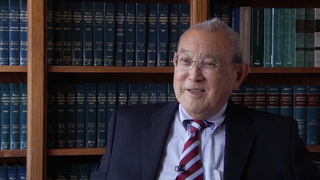Interviews
Treatment by Chinese students
I used to tell my friends that, you know, the Chinese people treat me better than the white people did on the West Coast. (laughter) And here Japan was at war with China, but they were very understanding. They treated me—they accepted me more as an American than anyone else.
In fact, one time, I happened to be in Chicago—University of Chicago—and the Chinese students said [to me], you know there's a banquet—Chinese banquet going on by the Midwest Chinese Student Club. so why don’t you come along, so I said, I can’t go to a Chinese banquet. Especially you know with the war going on and all that. But they said, oh, don’t worry, he said, we’ll get you in. So I went with them, and this one person went to the registration area and registered me in, came back and said, your name is Richard Wang, tonight.
Date: July 1-2, 1998
Location: California, US
Interviewer: Mitchell Maki, Darcie Iki
Contributed by: Watase Media Arts Center, Japanese American National Museum
Explore More Videos









Postwar school-life
(b. 1930) Half Japanese and grew up in both Japan and the United States.

On Challenging Institutions
(1938-2020) Japanese American attorney and civil rights activist

Pop and Balls
(1938-2020) Japanese American attorney and civil rights activist

Re-examining Identity
(1941-2018) Japanese Canadian photojournalist and activist

Being Denied as a Japanese American Lawyer
(b. 1934) The First Japanese American Appointed to the U.S. Court of Appeals.


